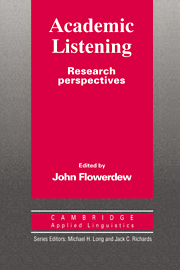Book contents
- Frontmatter
- Contents
- List of contributors
- Series editors' preface
- Acknowledgments
- Introduction
- I BACKGROUND
- II THE SECOND LANGUAGE ACADEMIC LISTENING PROCESS
- III DISCOURSE OF ACADEMIC LECTURES
- Chapter 6 Topic identification in lecture discourse
- Chapter 7 Variations in the discourse patterns favoured by different disciplines and their pedagogical implications
- Chapter 8 University lectures – macro-structure and micro-features
- IV ETHNOGRAPHY OF SECOND LANGUAGE LECTURES
- V PEDAGOGIC APPLICATIONS
- Conclusion
- Index
- Subject index
Chapter 7 - Variations in the discourse patterns favoured by different disciplines and their pedagogical implications
Published online by Cambridge University Press: 05 October 2012
- Frontmatter
- Contents
- List of contributors
- Series editors' preface
- Acknowledgments
- Introduction
- I BACKGROUND
- II THE SECOND LANGUAGE ACADEMIC LISTENING PROCESS
- III DISCOURSE OF ACADEMIC LECTURES
- Chapter 6 Topic identification in lecture discourse
- Chapter 7 Variations in the discourse patterns favoured by different disciplines and their pedagogical implications
- Chapter 8 University lectures – macro-structure and micro-features
- IV ETHNOGRAPHY OF SECOND LANGUAGE LECTURES
- V PEDAGOGIC APPLICATIONS
- Conclusion
- Index
- Subject index
Summary
Abstract
In a recent paper Olsen and Huckin (1990) argue that a “point-driven” strategy rather than an “information-driven” one is required for comprehension of engineering lectures. They argue that students need to grasp the framework of main points provided by the lecturer as a means of organising the information in the lecture into a coherent “narrative” (Myers 1990) and that many of the non-native students in their study had failed to understand links between the various points of information presented by the lecturer. They show that the lecture used in their experiment was based on two main organising frameworks, a problem-solution pattern and the relationship between experimental data and theory.
Drawing on the author's experience in running team-taught sessions for M.Sc. courses in both Highway Engineering and Plant Biology, this chapter shows how the above two frameworks are typical of Highway Engineering lectures but less so of Plant Biology lectures. Plant Biology draws more heavily on a theoretical framework based on the work of various taxonomists who have developed systems of classification for plant genetic material. Thus the points made in many Plant Biology lectures are concerned with the classification and description of key crops.
The chapter accepts the argument for a point-driven approach to lecture comprehension but argues that students and ESP lecturers need to be aware of the different frameworks or narratives that different disciplines use.
- Type
- Chapter
- Information
- Academic ListeningResearch Perspectives, pp. 146 - 158Publisher: Cambridge University PressPrint publication year: 1995
- 8
- Cited by



